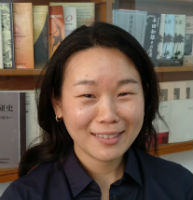Anna Sera is Researcher (2018-19) of the Center for Japanese-Brazilian Studies, São Paulo (Centro de Estudos Nipo-Brasileiros: CENB-SP).
 As a doctoral candidate in Education Policy Studies and Sociology at Indiana University, Bloomington (U.S.), Sera's primary research agenda focuses on the education of immigrant-origin students and their sociocultural integration in schools and society at large. Her dissertation study examines immigrant students' integration in schools using a comparative approach between Brazil and Japan. She investigates the case of Brazilian youth with Japanese ancestry who are visible ethnic minorities not only in Brazil but, more recently, also in Japan. Through her work as a teacher and researcher in Japan and the U.S., she has challenged the assimilationist approach that gives centrality to integration within the host-country. Instead, she has examined immigrant youth's educational opportunities and social participation as shaped by the domestic and international forces that influence ethnic and transnational (between host- and home-countries) communities.
As a doctoral candidate in Education Policy Studies and Sociology at Indiana University, Bloomington (U.S.), Sera's primary research agenda focuses on the education of immigrant-origin students and their sociocultural integration in schools and society at large. Her dissertation study examines immigrant students' integration in schools using a comparative approach between Brazil and Japan. She investigates the case of Brazilian youth with Japanese ancestry who are visible ethnic minorities not only in Brazil but, more recently, also in Japan. Through her work as a teacher and researcher in Japan and the U.S., she has challenged the assimilationist approach that gives centrality to integration within the host-country. Instead, she has examined immigrant youth's educational opportunities and social participation as shaped by the domestic and international forces that influence ethnic and transnational (between host- and home-countries) communities.
At CENB-SP, Sera is investigating the immigrant education of Japanese Brazilian children in Brazil. This includes a historical examination of the educational environment of Japanese Brazilian children since pre-World War II times until today through analysis of CENB's archives, observations and interviews. In particular, she looks at the roles and relationships of Brazilian, Japanese local government institutions and various local Japanese ethnic community organizations, which established and administered schools and related educational programs. Considering such diversity of educational providers, she considers the influence of a diversified educational environment for the identity formation and social integration of the children of Japanese Brazilians.
Sera was born and raised in São Paulo until middle school as the daughter of Japanese parents, then completed high school and undergraduate studies in Japan, and moved to the U.S. to pursue graduate studies. At different stages and in different places, she encountered varied perspectives on how her own education should take shape, reflecting the diverse expectations and concerns of the parties involved: her parents’ desire to give their daughter the opportunity to succeed both in Brazil and Japan, as well as learning their culture and language; and the development of her own Brazilian and Japanese identity. Sera maintains that the surrounding society also plays a role when programs and public policies highlight narratives of future global citizens or personnel that connect two countries, as well as those that highlight obstacles, such as those faced by children of dekaseguis, characterized as “rootless” or “double-limited,” which are experiencing adjustment and communication difficulties in both societies. These issues are part of the past and present, but also of the future. They are relevant to her two children, whom Sera shares with her American husband of Japanese and Korean heritage, and many other children living in a time of globalization of educational and career opportunities. Sera believes there is always a lot to learn from the experiences and history of our ancestors and forebearers.